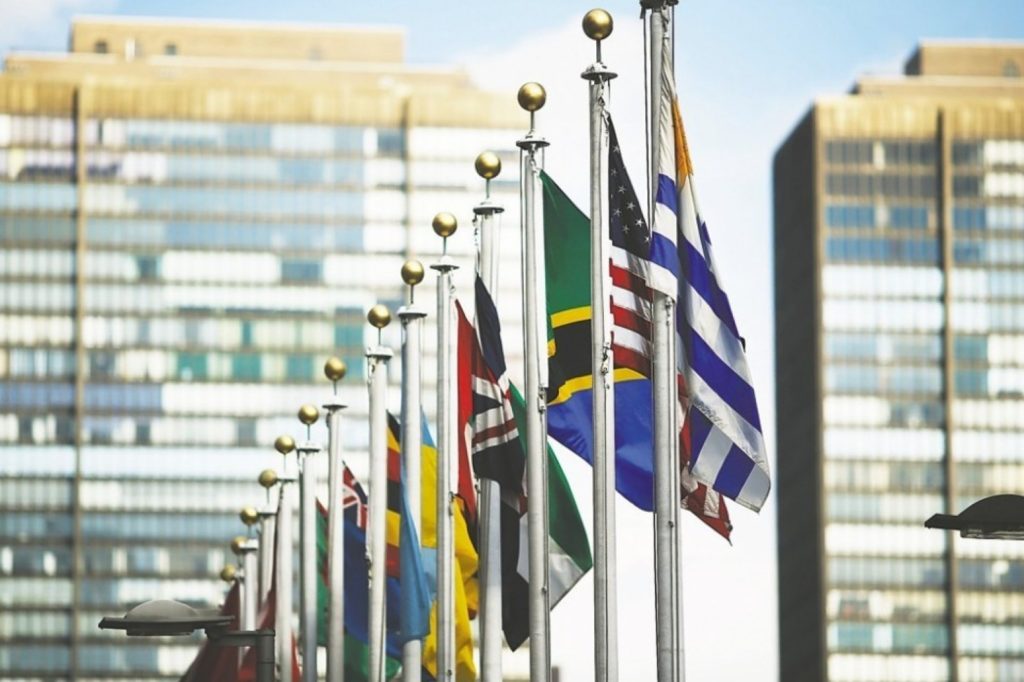Why International Justice Still Faces Roadblocks
JUSTICE, 26 Jun 2017
Richard Dicker – The Washington Post

Flags fly outside of the United Nations’ headquarters on Jan. 26 in New York City. (Spencer Platt/Getty Images)
22 Jun 2017 – The prospects for justice for crimes against humanity and war crimes are more daunting today than at any time in the past two decades. The underlying political landscape is less favorable for accountability as compared with the 1990s, when the first international tribunals were established following the end of the Cold War and the International Criminal Court’s (ICC) Rome Statute — the cornerstone of the international justice system — was completed in 1998. At the same time, there are important new opportunities to pursue justice through both national and international efforts.
One feature of the negative change is the ever-clearer division among the five permanent members of the United Nations Security Council. The blockage has particular impact on accountability because the council can ask the ICC to investigate through a “referral,” an especially powerful tool for countries where the ICC otherwise lacks authority because these countries have not joined the court.
The council referred the situation in Darfur (2005) and Libya (2011) to the court. Because of a lack of international support for arrests, these two referrals have vexed the court and yielded little for victims.
The authority given to the ICC in 1998, a high-water mark of the international community’s commitment to accountability, was based on a consent-based international treaty negotiated by states. Its arrest and cooperation provisions can be difficult to implement even among those that nominally agree to be bound by the ICC.
Council referrals are one of two exceptions to the consent regime, but even this can be blocked by a veto from any one of the permanent five. The reality is that countries that don’t consent remain outside and immune from the court’s reach.
It’s hardly surprising that the most powerful states — the United States, China and Russia — have not opted in and don’t allow their closest allies to be subject to the court by Security Council referral. It’s striking that armed conflicts marked by grave crimes are proliferating in countries that are not ICC members. As civilians are slaughtered without any access to redress, the inherent limitations of the court’s structure stand out more prominently, and the court, wrongly, gets the blame.
While there is a greater need for accountability, there is also less financial willingness to sustain it. Several of the largest government contributors to the ICC’s budget rigidly insist that the ICC should hold costs to “zero nominal growth.” In the face of increasing demands on the court, a few of these big contributing member states are holding the court to a standard that is infringing on the prosecutor’s ability to open new investigations or adequately staff existing ones.
In the face of these challenges there have been, nonetheless, several noteworthy developments.
The ICC’s leadership is trying to learn from earlier mistakes, make changes and steer the institution in the direction that it needs to go. This is clear in a few important areas:
- In the Office of the Prosecutor, its teams are trying to create “trial ready” cases at a much earlier point, instead of running the risk of having insufficient evidence when investigations become more difficult. Prosecutors are also relying more on forensic evidence.
- The judges have identified a set of best practices to encourage more efficient and effective management of proceedings.
- The Registrar, amid controversy, has completed an internal reorganization, strengthening the court’s presence in countries where it carries out investigations. This is critical to making the proceedings meaningful in the communities most affected by the crimes.
All but one of the ICC’s investigations had been in Africa. That generated strong backlash against the court initiated by a small number of African leaders who feared the ICC’s authority reaching them. It also became a source of criticism among some who supported justice but believed that the court needed to expand its work to other regions. Nevertheless, many African civil society organizations and a number of governments on the continent have stood up for the ICC and may have stanched this riptide.
Even more intense opposition to the court may escalate from Russia and the United States. At the United Nations, Russia has struck back vindictively against the ICC in reaction to prosecutor Fatou Bensouda’s decision to investigate crimes arising from the August 2008 conflict between Georgia and the breakaway region of South Ossetia, a Russian protectorate, as well as her office’s ongoing examination of the situation in Ukraine.
Meanwhile, the prosecutor is considering opening an investigation in Afghanistan that could look at, among other offenses, crimes believed to have been committed by U.S. armed forces and CIA personnel. Alleged crimes on the territory of an ICC member state — Afghanistan — provide the second pathway to citizens of states that have not joined the ICC.
While a panel of judges will have to approve any call for an Afghanistan investigation before the prosecutor can proceed, the backlash from Washington will most likely be severe. The United States has historically, if selectively and unevenly, supported the ICC, but subjecting U.S. nationals to international courts has been a red line. An investigation in Afghanistan that includes an examination of U.S. abuses could be a justice game changer, extending the reach of justice to the United States, which has been an “accountability free zone” for the most serious crimes committed by its forces.
Undoubtedly, an investigation in Afghanistan could also lead to a much stormier and contentious period for the court. Should this occur, the role of the court’s 124 member states is likely to be critical. Whether they step up and make clear that the ICC is their court and must be allowed to go about its important work free from outside political interference could tip the balance.
The Rome Statute’s upcoming 20th anniversary – July 17, 2018 — may provide just such a rallying point. The ICC’s founding document, while imperfect, represents a major historical achievement when impunity, and not accountability, has for too long been the norm.
__________________________________
 Richard Dicker is international justice director at Human Rights Watch.
Richard Dicker is international justice director at Human Rights Watch.
Go to Original – washingtonpost.com
DISCLAIMER: The statements, views and opinions expressed in pieces republished here are solely those of the authors and do not necessarily represent those of TMS. In accordance with title 17 U.S.C. section 107, this material is distributed without profit to those who have expressed a prior interest in receiving the included information for research and educational purposes. TMS has no affiliation whatsoever with the originator of this article nor is TMS endorsed or sponsored by the originator. “GO TO ORIGINAL” links are provided as a convenience to our readers and allow for verification of authenticity. However, as originating pages are often updated by their originating host sites, the versions posted may not match the versions our readers view when clicking the “GO TO ORIGINAL” links. This site contains copyrighted material the use of which has not always been specifically authorized by the copyright owner. We are making such material available in our efforts to advance understanding of environmental, political, human rights, economic, democracy, scientific, and social justice issues, etc. We believe this constitutes a ‘fair use’ of any such copyrighted material as provided for in section 107 of the US Copyright Law. In accordance with Title 17 U.S.C. Section 107, the material on this site is distributed without profit to those who have expressed a prior interest in receiving the included information for research and educational purposes. For more information go to: http://www.law.cornell.edu/uscode/17/107.shtml. If you wish to use copyrighted material from this site for purposes of your own that go beyond ‘fair use’, you must obtain permission from the copyright owner.